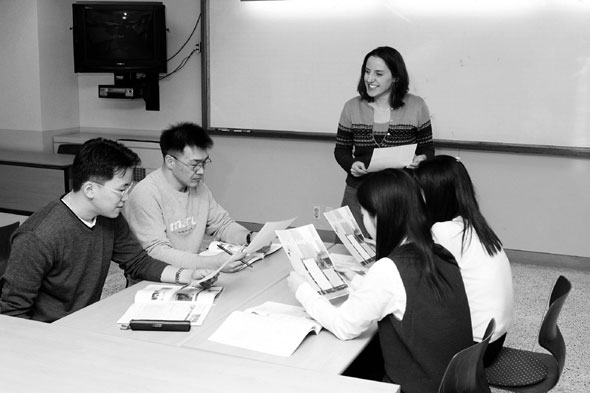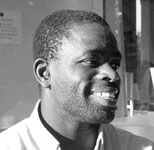 | ||
"IREALLY dislike my English Conversation class," states Jeong Suk-won (Fresh., Area of Social Studies) "I expected many sessions with speaking practice but in reality we hardly spoke English. Quite frankly, the only time we practiced was during exam period; nothing much was different from high school classes."
This is a common complaint found amongst students. Many express their dissatisfaction about the way foreign languages are taught. Instead of participating in active classes while interacting with a native speaker, students are stuck in a class simply copying things down. Making use of the information obtained is the whole object of language study, but this purpose is not being fulfilled properly.
Global Yonsei?
Currently in Yonsei Univ., many foreign language classes are set up every term. Every freshman student must take at least two English classes in their first year and those in the Area of Liberal Arts at least one second language class as well. In addition, there are foreign language classes as general subjects, from selections such as Practical Chinese, German, French, Russian and Japanese.
The problem with the current system is that it is very difficult to start learning a new language at school. As there are no specific restrictions or requirements on taking the foreign language classes, students from foreign language high schools or with living experience in another country take advantage of the situation. For example, according to instructor Kang Ok-kyung, more than 50% of the students in her Practical French class were these cases. This procedure is so common that it has become the unwritten law for complete beginners to avoid these foreign language classes, as they would only get C's no matter how hard they studied.
The school also does not set a particular course for each foreign language. For every language there are the elementary classes such as French (1) and French (2) which cover the basics, but there are no classes in the upper level. The students who once began learning a new language with enthusiasm find their education halted midway. Adding to the problem, there are not enough lessons per week. Every class is held three hours a week with the freshmen English classes having a meager two. The classes are also way too large, while the most appropriate number of students per class is considered 20 or less, some have up to 50. Too many students mean that the instructor cannot pay much individual attention. Interaction with a native speaker is extremely important, especially for beginners, but in many cases this is not carried out.
The problems lie the deepest for the second languages: French, German, Russian and Chinese. The school is not putting emphasis on this area, neglecting development of these languages. With the lack of school support, each language department is struggling to provide quality education. The insufficient number of native speakers is a serious problem; at the moment there are none teaching the beginners classes. Many lecturers are not up to the standard of student satisfaction as not all instructors have the highest qualifications.
Meanwhile in a land far away
UC Berkeley is a school famous for its diverse language programs. Each language department, ranging from Dutch to Swahili, provides many intensive language courses. For every language there are classes in which the students can select according to their level. With the students studying according to their abilities, beneficial classes are guaranteed. Placement guidelines are set so that the students can select the most appropriate class. In the German Department for example, classes are divided into courses for Absolute Beginners one for Not-So Absolute Beginners and another for Students with one, two, three or more years of high school education in German. In order to maintain classes with students of the same level, there is a Language Certification System. Each department performs an oral or written test for students applying for class.
In order to provide the most effective education, the school sets scenarios for the students. The scenarios are a year-long course with classes placed in order. As all classes are part of these programs, a prerequisite of a particular grade in a previous class is always required. A large number of classes are available for every level, which can become confusing at times. For students unsure about their placements, meetings with the Language Program Coordinator can be arranged to make the most efficient schedule.
At UC Berkeley, education for beginners is taken very seriously. All beginners classes are a basic five hour week schedule with other class meetings three or five times a week. In these meetings, students are put into groups and have practice sessions with the instructor. All classes can only take up to 20 students, many classes are conducted entirely in that particular language. A weekly conversation table, in which students can practice using the foreign language informally with fellow learners and instructors, is always provided.
UC Berkeley is the host of an unique center called the BLC (Berkeley Language Center). The BLC serves as a resource center for all the language teachers. Teachers are informed of new developments in the fields of language study and are provided with new lesson materials. Modest funds to help lecturers attend professional meetings and develop new teaching projects are also available.
Changes for Yonsei Univ.
Yonsei Univ. fundamentally needs to rebuild the foreign language system. Methods of placing students into classes of similar proficiency are desperately needed. Assessment tools such as the Language Certification System of UC Berkeley would be beneficial for Yonseians. Some instructors like Kang take the time to teach beginners separately outside class and assess the students' exam results according to their capabilities, but mostly this is not the case. A detailed system needs to be made.
Along with placing the students into the right classes, developing an organized language course is crucial. In order to do so, many problems need to be solved. A larger variety of classes need to be created. Currently the number of classes is restricted as there is a serious lack of classrooms available in the General Classroom Complex. A system for arranging classes in other buildings effectively must be made. With the increased number of classes formed, more qualified instructors must be hired; the more native speakers the better. Yonsei Univ. is in need of facilities concerning language study. The school needs to invest in some computer-assisted writing labs as well as tape labs for language listening practice.
In the end
Providing the right education for foreign languages is very important. An environment where Yonsei Univ. students can learn languages effectively must be made. The school has a responsibility to provide high quality classes. If there are no classes at Yonsei Univ, where do the students turn to? Drastic changes must be made.
What is most important is that the teacher centered class is switched to student-generated learning. Education where students learn a language by passively sitting in a classroom and listening to an instructor all the time, while translating texts into Korean, is rather useless. The focus needs to be changed to learning how to use the language. Additionally, exams should be only used as a tool for learning.
|
"The mission of the Berkeley Language Center is to improve and strengthen foreign language instruction on the Berkeley campus by keeping teachers informed of new developments in the fields of language pedagogy, second language acquisition, and applied linguistics." |
| To The Students-From an English Instructor
Lancelot Bourne While there are many problems with the school system, the problem is not limited to simply that. The Yonsei Annals asked a foreign language teacher to see how students can make lessons more effective. Q : What sort of difficulties do you face when teaching students? A : I find that many students are passive when it comes to practicing English. Instructors are more than willing to help the students out, but many do not muster the courage to speak up. Q : Do you have any advice for students? A : Studying languages is a tedious process. To become fluent at a language, a lot of time and effort must be invested. Students should also have patience and try following the course that the instructors set. | |||||||||||||



